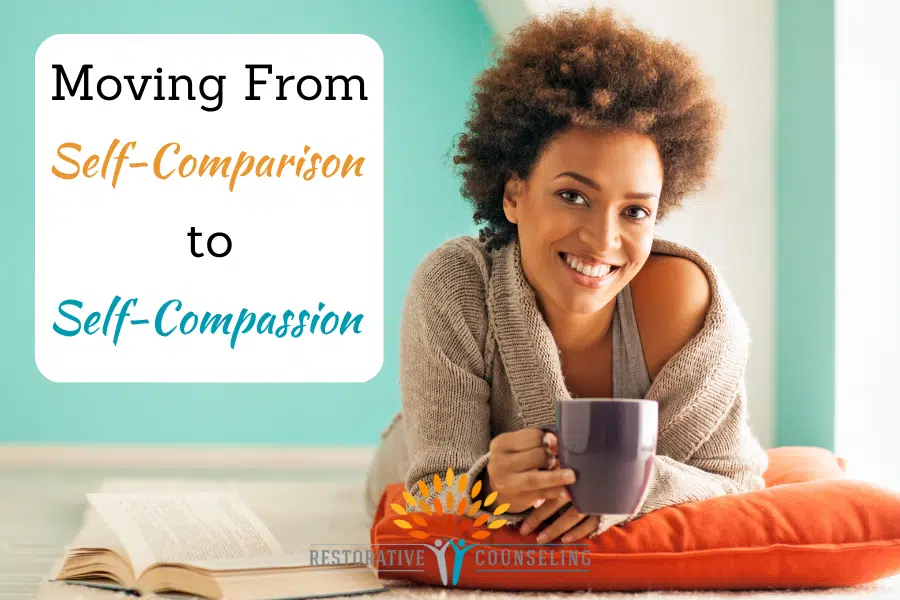Written by Katie Jackson-Griffin, LCPC
Spring is coming! Time to keep from falling into the trap of self-comparison.
Winter is coming to an end. The pace of life is picking back up, especially with the weather getting warmer. With the change in seasons, it can feel like there is pressure to be “out and about” more, wear the latest fashion trends, or to talk about going on impressive vacations.
Self-comparison is a natural human response
Just about everyone has an internal voice that points out how they are both different from and similar to others. As social creatures, humans use this voice to find points of connection with people around them. Sometimes, this voice can be a healthy motivator. However, when this voice gets too loud or too critical, it can make a person feel unmotivated, inferior, anxious, and possibly even lead to depression.
Society’s messages about beauty, lifestyle, and success don’t help
Social media plays a significant role in intensifying unhealthy self-comparisons. Each image and post are just a snippet of a person’s life that they want you to see – these posts don’t paint the full picture of what all happens in their life.
While you can’t completely turn off your inner critic or control the messages society shares, you can learn more about what triggers your self-comparison voice to go into “beat-down mode.” Knowing your triggers can help you better recognize destructive comparisons and learn to speak to yourself more compassionately.
Learn to escape the self-comparison trap
Take a look at these steps to help you become more aware of what activates your comparison critic and learn what you can do about it!
Step 1: Identify Your Triggers
Start to notice moments in your day when you are feeling down, insecure, anxious, or envious. Ask yourself if the feelings are in response to thinking about how someone else is “better” than you in some way. Take note of what is happening in the moment that is causing the comparison thoughts to occur. Did you learn that a friend got a better test score than you? Did your coworker get praised for a project they worked on? Were you looking at social media and seeing unrealistic images of body types or lifestyles? By identifying your self-comparison triggers, you will more quickly be able to change what the critical voice in your head is telling you.
Step 2: Tame Your Inner Critic
Now that you have identified what is triggering your critical thoughts, you’ll have better awareness about when to pay close attention to your thoughts. Whenever you’re observing these thoughts, try these strategies to reframe them.
- Change your inner dialogue. Talk to yourself as if you are talking to a friend who has these thoughts.
- Take on an observer role and identify the comparison thoughts as just thoughts that you don’t have to engage with.
- Create a strengths list and identify every skill, talent, and trait that makes you, you!
- Practice gratitude. Remind yourself of 5 things that you are grateful for today. There are many journaling prompts that can help get you started as well.
- Do some social media house cleaning! Unfollow or unlike any people or profiles that cause you to criticize your lifestyle, your body, or your value as a person.
Remember that practice is essential! Repetition of these strategies is necessary in order to feel the benefits. It might seem hard at first, but that is typical and okay.
Step 3: Treat Yourself With Kindness
Sometimes, it is okay to fall into the comparison trap. It happens to all of us! However, it’s important to not shame yourself when you notice the comparisons. Give yourself compassion and kindness. Afterall, you’re in the process of learning how to reduce that comparison voice. Change takes time. Giving yourself kindness instead of judging yourself will help you feel motivated to keep going.
If you still need support, Restorative Counseling can help!
The entire team at Restorative Counseling believes in the power of self-compassion. Kindness towards yourself can be the ultimate motivator to help you accomplish a stronger sense of self. Restorative Counseling is here to support you in learning how to overcome self-comparisons. To get started, schedule an appointment with one of our clinicians today.

Hi, I’m Katie!
I use HAES and DBT approaches to help people overcome their challenges with low self-esteem, anxiety, and depression. Read more about me.
Follow Restorative Counseling
Sign up for our newsletter

